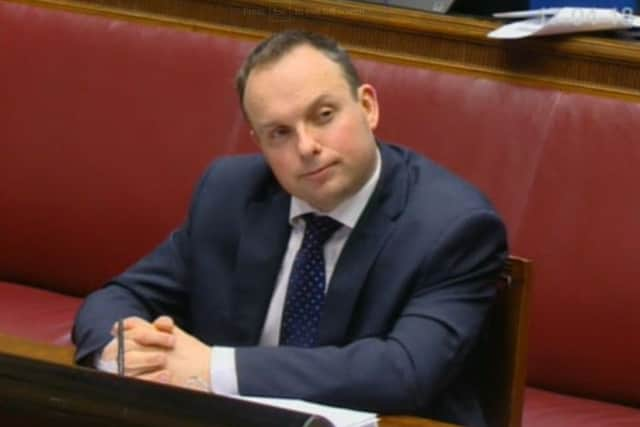DUP Spad told me 'we could fill our boots' with RHI cash, says top civil servant
and live on Freeview channel 276
Andrew Crawford, pictured, who has always denied that he tried to delay the scheme being reined in when it was out of control in mid-2015, is alleged to have made the comment more than a year later during a conversation with senior civil servant Andrew McCormick.
On the 111th and final day of evidence to Sir Patrick Coghlin’s public inquiry into the cash-for-ash scandal, Dr McCormick recounted the conversation which he said took place in late October 2016 – just over a month before RHI would become a huge political scandal.
Advertisement
Hide AdAdvertisement
Hide AdThe inquiry has already uncovered an email which shows that Dr Crawford felt it could be good to overspend on RHI because it was GB money.


When Dr Crawford resigned as a DUP Spad in January 2017 over allegations that he had acted to delay cost controls, Mrs Foster – who had hand-picked him as the Spad who was by her side for most of her ministerial career – described him as “a faithful servant...to the people of Northern Ireland”.
Dr McCormick, the former permanent secretary of Mrs Foster’s Department of Enterprise, Trade and Investment (DETI), which set up and ran the green energy scheme, recalled how the former Spad was a “very relaxed...smiling Andrew Crawford” when he told him what his thinking had been.
The conversation took place during a corporate dinner for the food industry.
Advertisement
Hide AdAdvertisement
Hide AdDr McCormick told the inquiry: “He said ‘I thought this was AME [Treasury funding, rather than from Stormont’s budget] and we could fill our boots’.”
Sir Patrick said: “This was a direct conversation?”
Dr McCormick said: “Yes. This was a direct conversation with Andrew.” He added: “It was that conversation that led me, in drafting material for the First Minister’s statement, to give him some cover – indeed, the final version refers to a ‘misunderstanding of the funding’.”
Dr McCormick went on: “That was intended to soften the criticism of him. Because as I understood it at that time – maybe even based on ill-advised conversations with officials in my team - that was his view of the funding and that had influenced his behaviour.”
Inquiry panellist Dame Una O’Brien highlighted that Dr Crawford had been involved with RHI over many years. She asked: “But you gave him the benefit of the doubt – that he’d misunderstood it?”
Dr McCormick said: “Yes.”
Advertisement
Hide AdAdvertisement
Hide AdReferring to how he had suggested language for Mrs Foster’s speech to the Assembly in December 2016, Dr McCormick said: “Had I known at that time that Andrew Crawford had been aware of the abuse of the scheme in 2015, I would not have done that.
“In fact, I probably would have been outside the room, not doing any of this because that changes my perspective on this completely – and the single heaviest document in your entire bundle, to my mind, is the Howard Hastings email to Andrew Crawford....which conveys direct reference to the abuse of the scheme in summer 2015 which proves that Andrew Crawford was aware of that abuse at that time.”
Elsewhere in his evidence, Dr McCormick said he was “intensely angry” at the DUP for having using him for electoral purposes around the time of the RHI scandal breaking in public.
The party claimed in a 2017 pre-election “facts” leaflet – which at the time this newspaper analysed and described as “seriously misleading” – that Dr McCormick had “vindicated” Mrs Foster, when in fact he was in no position to do so.
Advertisement
Hide AdAdvertisement
Hide AdDr Crawford said the DUP had been “selectively” quoting him when it suited them – while distancing themselves from other things which he was saying.
Dr McCormick, one of Stormont’s most senior and most experienced civil servants, went on to speak bluntly – as he did two years ago before a Stormont committee – about his own role. He said “I feel ashamed personally” and “shame on us” in the civil service for the failures by officials. Referring to the moment where he and other officials agreed to delay cost controls at the request of a DUP Spad, Dr McCormick said: “I should have stood up. I should have asked for direction that day – and that’s my responsibility”.
Becoming briefly emotional, Dr McCormick said that while “it’s done me personal damage”, the scandal had undermined devolution – something in which he said he firmly believed. But he said that the inquiry report “can be a new foundation” for a new Stormont.